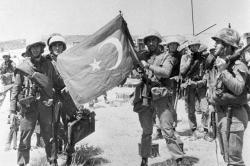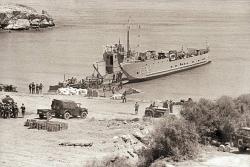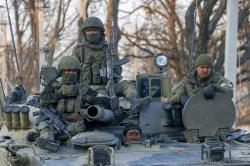Invasion Anniversary
 As Cyprus and Greece mark the anniversary of the Turkish invasion of 20th July 1974, many people are highlighting the uncanny parallels with the Russian invasion of Ukraine. The Greek and Cypriot communities question why Turkey got off nearly scot-free after its invasion while Russia is being hit with tough sanctions from the rest of the world. The universal appeal of defending one's own people from harm has been cited by Russia in its claim that there were neo-Nazis commiting a genocide against Russians and Russian speakers living in the Donbass region of Donetsk and Luhansk. Putin declared that Russia would defend those who had suffered persecution and genocide by the Kyiv regime. Turkey, as Russia, justified the Cyprus invasion with false genocide claims in their own propaganda.
As Cyprus and Greece mark the anniversary of the Turkish invasion of 20th July 1974, many people are highlighting the uncanny parallels with the Russian invasion of Ukraine. The Greek and Cypriot communities question why Turkey got off nearly scot-free after its invasion while Russia is being hit with tough sanctions from the rest of the world. The universal appeal of defending one's own people from harm has been cited by Russia in its claim that there were neo-Nazis commiting a genocide against Russians and Russian speakers living in the Donbass region of Donetsk and Luhansk. Putin declared that Russia would defend those who had suffered persecution and genocide by the Kyiv regime. Turkey, as Russia, justified the Cyprus invasion with false genocide claims in their own propaganda.
Many who remember the invasion of Northern Cyprus in 1974, with its ugly street fighting, its massacres of Greek citizens, its uprooting of a people whose ancestors had lived there since time immemorial, instantly recognised Russia's buzzwords and catchphrases which echo those used by Turkey decades earlier. Turkey's Government claimed there was a genocide against the 18% of Turkish-Cypriots living on the island, although no one outside Turkey believed that claim, or has believed it since then.
 The one main differece between the two invasions is that Cyprus had just undergone a government coup d'etat on 15th July 1974, instigated by the Greek military junta in Athens, by overthrowing the President of the Republic of Cyprus, Archbishop Makarios III, giving Turkey just enough of a pretext to invade just five days later. Approximately 40,000 Turkish troops raided the island under the code name of 'Operation Attila', an apt name for the barbaric attack against innocent civilians, which clearly violated the Charter of the U.N. Security Council. Turkish forces initially captured 3% of the island before a ceasefire was declared. Following the breakdown of peace talks, another Turkish invasion in August 1974 resulted in the capture and occupation of approximately 36% of Cyprus' northern territory.
The one main differece between the two invasions is that Cyprus had just undergone a government coup d'etat on 15th July 1974, instigated by the Greek military junta in Athens, by overthrowing the President of the Republic of Cyprus, Archbishop Makarios III, giving Turkey just enough of a pretext to invade just five days later. Approximately 40,000 Turkish troops raided the island under the code name of 'Operation Attila', an apt name for the barbaric attack against innocent civilians, which clearly violated the Charter of the U.N. Security Council. Turkish forces initially captured 3% of the island before a ceasefire was declared. Following the breakdown of peace talks, another Turkish invasion in August 1974 resulted in the capture and occupation of approximately 36% of Cyprus' northern territory.
The United States did impose an arms embargo on both Turkey and Cyprus after the 1974 invasion, but was lifted on Turkey after just three years by U.S. President Jimmy Carter, whereas the arms embargo on Cyprus remained in place until December 2019.
 As Turkey's military occupation went unpunished, around 162,000 people were expelled from the northern part of the island, where Greek-Cypriots had constituted 80% of the population. Over the ensuing years, Turkey resettled thousands of its own people from the mainland into the northern occupied territory of Cyprus, much like Russia had done in Ukraine following the genocide of millions of Ukrainian people that died in the Holodomor enforced famine of the 1930's. In 1983, the U.N.'s Security Council Resolution 541 considered the attempt by Turkey to create the Turkish Republic of Northern Cyprus as invalid. This U.N. judgement was the harshest punishment levied on Turkey after its brutal invasion and would have given Putin great optimism for his invasion of Crimea and Ukraine.
As Turkey's military occupation went unpunished, around 162,000 people were expelled from the northern part of the island, where Greek-Cypriots had constituted 80% of the population. Over the ensuing years, Turkey resettled thousands of its own people from the mainland into the northern occupied territory of Cyprus, much like Russia had done in Ukraine following the genocide of millions of Ukrainian people that died in the Holodomor enforced famine of the 1930's. In 1983, the U.N.'s Security Council Resolution 541 considered the attempt by Turkey to create the Turkish Republic of Northern Cyprus as invalid. This U.N. judgement was the harshest punishment levied on Turkey after its brutal invasion and would have given Putin great optimism for his invasion of Crimea and Ukraine.
No economic sanctions of any kind were levied on fellow NATO member Turkey after its brutal invasion, there was no banning of Turkish Airlines overfly airspace over Europe, no exclusion of Turkish participation in anything akin to the SWIFT financial network, which will deal a crippling blow to Russia's monetary system and economy. One is left to wonder why so few sanctions were levied on Turkey, which as a fellow NATO nation should be held to the highest standards of conduct with another NATO alliance member.